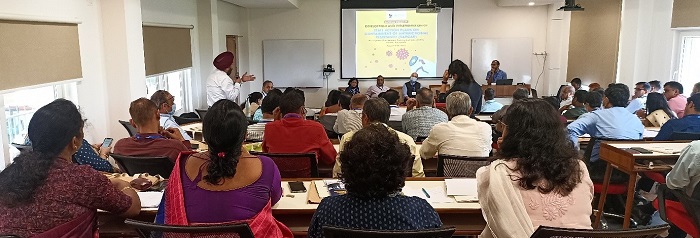Inaugural session of the SAPCAR workshop
Recognizing antimicrobial resistance (AMR) as a key threat to global health, food security, and development, the WHO Country Office for India and Centre for Science and Environment (CSE) organized a workshop to trigger action on developing and implementing state action plans for the containment of AMR (SAPCAR) from 8–10 August 2022 at Neemli in the state of Rajasthan.
Speaking at the event, WHO Representative to India Dr Roderico Ofrin called attention to the need for bridging silos between sectors through sharing information, best practices and collaborating on sector-specific activities.

Inaugural session of the SAPCAR workshop on 8 August in Neemli, Rajasthan. © WHO India
Effective strategies to combat AMR necessitates adoption of “one health” – a collaborative, multisectoral and transdisciplinary approach – which recognizes the interlinkages between humans, animals, plants and the environment as well as the need to work cohesively at the local, regional, national and global levels.
About 77 participants from 19 states and union territories including experts from environment, livestock, fisheries, crops, and food sectors attended the event to discuss way forward.
India’s National Action Plan on Antimicrobial Resistance (NAP-AMR) and the Delhi Declaration on AMR launched by Union Ministers for Health and Family Welfare, Environment, and Food, underscore the political commitment to tackle AMR.
The NAP-AMR envisages the development of SAPCAR since human health, animal health, agriculture, fisheries, water, and sanitation are all state subjects under the Indian constitution.
In addition to death, disability, AMR results in longer hospital stays and financial hardship for those impacted. The cost to the economy too is quite significant. In 2019, bacterial AMR infections caused nearly 1.3 million deaths globally and played a role in 5 million deaths. By 2050, India is expected to have two million deaths every year due to AMR.
An intersectoral collaboration and action at the state level will be critical for AMR containment. Currently, only three states have formally launched their SAPCAR – Kerala, Madhya Pradesh and Delhi.
The workshop will serve in expediting the roll-out of state action plans on AMR and addressing challenges that need to be understood and addressed for effective implementation at the sub-national levels.
